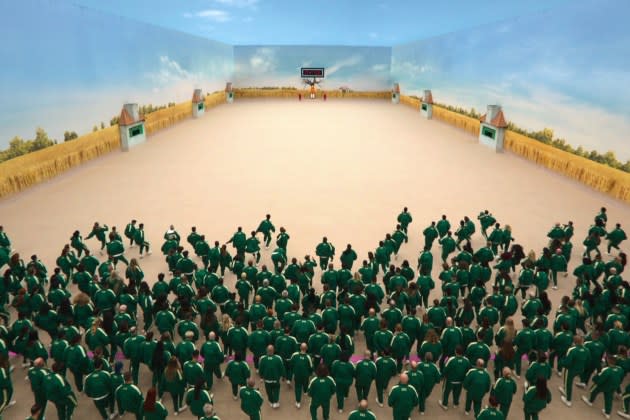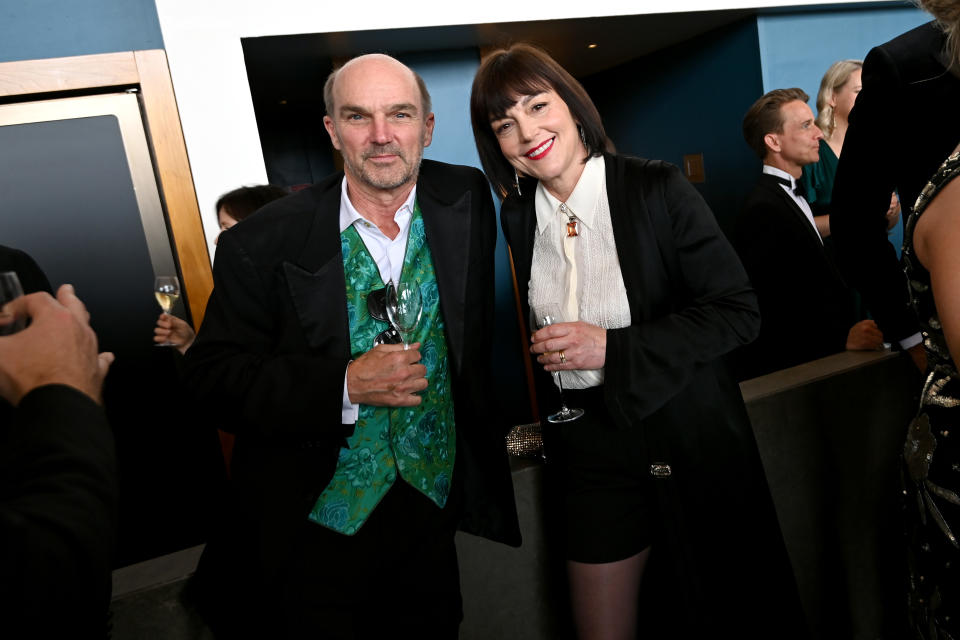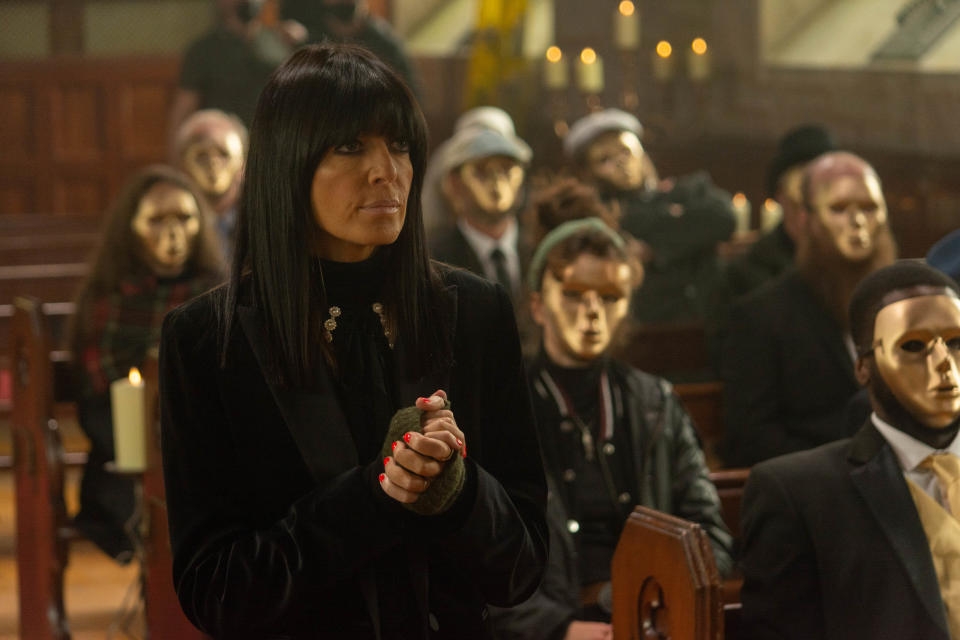Studio Lambert Bosses Talk “Breaking The Conventions Of Reality TV” On ‘Squid Game: The Challenge’, Casting New Seasons Of ‘The Traitors’ & Hopes For A First Returning Drama Series
- Oops!Something went wrong.Please try again later.
- Oops!Something went wrong.Please try again later.
- Oops!Something went wrong.Please try again later.
- Oops!Something went wrong.Please try again later.
- Oops!Something went wrong.Please try again later.
- Oops!Something went wrong.Please try again later.

Studio Lambert has introduced the world to Gogglebox, Race Across the World and The Circle but the indie has faced its greatest test in Netflix’s Squid Game: The Challenge, and the road has been a bit of a bumpy one.
Stephen Lambert’s 15-year-old British production house, which its founder says is having its busiest year following a strategic shift to “go big” on premium unscripted, took on its grandest undertaking when Netflix gave it the weighty reins to the Squid Game competition series.
More from Deadline
Alongside fellow UK indie The Garden, Studio Lambert has subsequently overseen a competition with 456 contestants – about 20 times that of the average reality show – with the largest prize fund in history.

“We are trying to the break the conventions of reality TV,” Lambert tells Deadline at his indie’s plush Central London office in the weeks leading up to Squid Game: The Challenge’s launch, while Creative Director Tim Harcourt, an EP on the show, describes the undertaking at Bedford’s Cardington Studios as “like D-Day.”
In The Challenge, contestants chase the mammoth $4.56M prize by playing the elimination games made famous worldwide by Netflix’s most-watched show of all time, including Red Light, Green Light and Glass Stepping Stones, along with several new games.
While the months-long audition process, building of enormous sets, lengthy filming and monstrous edit were all highly taxing, Lambert says the biggest challenge has been “getting an audience to care about a cast of 456.”
“The conventional wisdom is that you can’t make an unscripted show with more than 20 because the viewer won’t know who anyone is or care about anyone,” he adds. “The logistics of making the show were hugely demanding and took an enormous effort from everyone involved, but editorially it was like, ‘How are we going to get anyone to care?’.”
Focusing on “three-dimensional, morally complex” contestants and eschewing “the black and white of heroes and villains” was the team’s solution, Lambert says, as they attempted to “break the conventions of reality TV.”
But this challenge was made trickier by the fact that, just as viewers are warming to a player, they may be eliminated. The edit was therefore even more integral than usual, according to Harcourt, who says the show focuses on around 30 to 40 players plus “peripherals.”
“Dovetailing with making sure the audience cares about people that lose is making sure they care about the people they end up with,” he explains. “You might meet players properly at the end of episodes five and six but you are also looking for little moments with them early on so they don’t completely come from nowhere. There is a real artistry to it.”
At the same time, the producers wanted to make sure that people are “given the space to show who they are as characters,” Harcourt says.
“There’s a bit of luck involved in the games and they are not particularly revealing of character so we were always looking for ways to bring out people’s moral standpoint,” he says. “We work hard to find those moments where contestants can be put on the spot, doing something that would betray or reveal their character to the audience or the people they are playing with.”
Hwang set visit

Lambert is confident the show will be a success and says for Netflix it was a no-brainer, given that the streamer “had a hugely successful scripted show about a game” on its hands.
He reveals that Squid Game creator Hwang Dong-hyuk visited the set during filming. Given that much of Hwang’s drama’s scenes were shot using CGI, he remarked, “Oh my god you actually built it all for real” when he visited, according to Lambert.
“In drama you know exactly what is going to happen but we had this enormous prize at stake so had to be scrupulously fair,” adds Lambert of the process of putting the games together. “Everything had to be independently adjudicated and done according to the rules. This had to be played as a ‘real game’.”
With this in mind, the show hit a roadblock earlier this year when several contestants broke rank to anonymously tell several publications that they had faced “inhumane” conditions during filming. Four players recalled to Rolling Stone how a two-hour game lasted up to nine hours in freezing temperatures, with one claiming he suffered a herniated disc and a torn knee tendon during production. Another participant claimed to have developed pneumonia and an ear infection. Deadline subsequently revealed that Britain’s Health & Safety Executive had been called in but ultimately decided that no further action was necessary.
With several months having now passed, Lambert and Harcourt shrug off the reports, pointing out that all players were assessed medically beforehand.
“It was cold,” says Harcourt. “People were warned about [the cold] and yes it made the game tougher but the games should be tough.”
Positing that “some unhappy people who had been eliminated decided to anonymously complain,” Lambert says conditions on The Challenge were far better than competition behemoths like SAS: Who Dares Wins or Survivor.
“Squid Game is such an enormous, global, cultural phenomenon that almost anything anyone might say about it would be of interest,” he considers. “If we had been making a new unscripted show where some people had complained about being eliminated and being cold it is unlikely it would have made the front page of [British tabloid] The Sun.”
The heft of Netflix’s Squid Game: The Challenge marketing and big budget has been a bit of a double-edged sword, therefore, and Harcourt says on the positive side “you can feel the weight of one of the biggest companies in the world getting behind the show,” having doubled down on trailers, advertising and round-the-world promotion. Amazon Prime Video is set to launch an equivalent in two days time in the form of Brian Cox-helmed James Bond mega-competition 007: Road to a Million.
“I wouldn’t be surprised if Netflix start thinking of big unscripted shows like The Challenge as cheaper versions of drama,” says Harcourt. “They might set the bar higher and make two or three different plays like this a year.”
Comparatively smaller in marketing and budget is Surviving Paradise, another Studio Lambert show for Netflix that at time of writing is performing well in the streamer’s top 10 global charts.
The show, which sees players form alliances and fight to move from the wilderness into a luxurious villa for a shot at a cash prize, has been three years in the making, with several Covid-induced false starts. In a similar vein to The Circle, which has just been recommissioned for Seasons 6 & 7 as filming moves from the UK to Atlanta, Lambert and Harcourt are hopeful Surviving Paradise can run and run. “Cost and expectations are lower than Squid Game: The Challenge but I think it’s doing well,” says Harcourt.
“Going big”
Studio Lambert made the decision to “go big” several years ago, its bosses say, by eschewing the high-volume cheaper formats it had been birthing for so many years in favor of more expensive, premium unscripted fare, while it also moved into drama. The development team, which is based in the UK and U.S., only prepares around 10 pitches per year, which tend to be positioned at more than one buyer. Favored suppliers include Netflix, the BBC and NBC.
While it is no doubt “a tough time to be a producer” in any genre, Lambert says there is “work to be had if you can persuade buyers you can deliver on large-scale unscripted shows.” “Fortunately, once you’re in that club, there aren’t that many members,” he adds.
Netflix’s decision to hand Studio Lambert and The Garden the keys to Squid Game: The Challenge is testament to the fact that many of this club’s “members” are currently based in in Britain, Lambert says, as he points to huge unscripted shows coming out of the UK including Too Hot to Handle, the rebooted Survivor and Big Brother. The dual labor strikes, Lambert and Harcourt posit, did not lead to the U.S. unscripted boom that emerged from the previous action in 2007-08.
Crewing up in order to service all these shows isn’t easy, says Lambert, even bearing in mind a recent Bectu survey that found three-quarters of below-the-line British TV freelancers out of work.
“There’s definitely a capacity problem [in the UK],” he says. “There is a concentration of work in one particular genre but that doesn’t necessarilly match [freelancer] demand, which is for lower cost shows that aren’t happening so much because British buyers aren’t going for them.”
Lambert says this played a part in the decision to move The Circle’s filming to the U.S. He stresses that his All3Media-backed outfit has the “network” to crew up for its revolving plethora of big-budget greenlights, but says buyers need to appreciate “there is a lag between that moment of committing to doing the show and going into production.”
‘The Traitors’

Next on the horizon is a second season of The Traitors, the smash guessing game format that thrilled audiences on both sides of the pond when versions aired on the BBC and Peacock just under a year ago, not to mention in a wealth of other territories (distributor All3Media International has called The Traitors the “fastest-selling format” out there at present). Demonstrating its commitment to the format, the BBC has taken the unusual step of greenlighting a third run before launching the second.
Studio Lambert makes both versions and has been busy focusing on keeping Season 2 fresh, now that contestants and audiences alike know the ins-and-outs of the game.
The difference between the two versions will be more pronounced this time around as the Peacock version moves from hybrid celebrity-civillian casting to 100% reality TV celebrities, while the British version has once again sought “people from a range of ages who aren’t ‘TV wannabees’,” according to Lambert. This neatly illustrates how reality TV audiences differ on both sides of the pond.
“In America, the audience that loves reality is huge and it is financially viable to superserve them with a show packed full of reality stars,” adds Harcourt. “In the UK that’s not quite enough. Hit shows like Bake Off and I’m a Celebrity have to lock in the reality audience plus ‘everyday audiences’ – the people you hear saying ‘I’m not one for reality but I love The Traitors’.”
Lambert adds that younger audiences have developed a penchant for watching older contestants, which helps lock them in alongside older viewers and will be utilized again on the upcoming Traitors UK. He loves to deploy innovative casting, with the BBC’s Celebrity Race Across the World – also renewed yesterday for a second season – coming in for praise for the decision to pair celebrities with non-celebrity relations/friends.
Several weeks after The Traitors Season 1 launched, Channel 4 had its own bite at the cherry with another Studio Lambert format, the Traitors-esque Rise and Fall, but this show failed to cut through in the same way and has become somewhat emblematic of that network’s current struggles.
A decision on Season 2 is expected soon and Lambert says a recommission is “very much in play,” while Harcourt points to constraints on the show’s first run including a daily fast-turnaround edit and a budget that was “good but less than Netflix’s or the BBC’s.”
The pair have their sympathies for Channel 4, one of Studio Lambert’s biggest clients, and Lambert acknowledges that the network “expected [ad revenue] to pick up faster than it has done, which has complicated things.”
Supercharging scripted
Elsewhere, Lambert communicated a desire to grow his outfit’s scripted output to account for “around a third of what we do in an ideal world.”
His immediate hopes rest with Boarders, Daniel Lawrence Taylor’s BBC Three show launching early next year that follows five underprivileged Black students who win scholarships to an elite British boarding school, which Lambert believes could be his company’s first returning scripted series.
Studio Lambert entered the scripted space several years ago and has since made a trio of BBC projects, BAFTA-winner Three Girls, The Nest and Three Families, along with Amazon Prime Video’s The Feed, but Lambert stressed unscripted still makes up by far the greatest slice of its overall pie.
“Drama is something we are pleased to have and we would like it to become bigger,” says Lambert. “If Boarders becomes a returner then that will help us a lot, it will give heft to our department.”
For now, Lambert and Harcout have plenty plates to spin, and they anticipate an even bigger year in 2024. The challenge is on.
Best of Deadline
2023 Premiere Dates For New & Returning Series On Broadcast, Cable & Streaming
2023-24 Awards Season Calendar - Dates For Oscars, Emmys, Grammys, Tonys, Guilds & More
SAG-AFTRA Interim Agreements: Full List Of Movies And TV Series
Sign up for Deadline's Newsletter. For the latest news, follow us on Facebook, Twitter, and Instagram.

